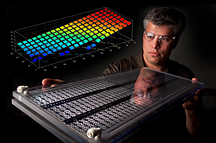- Number 315 |
- July 6, 2010
Energy saving air conditioner conquers all climates

NREL senior engineer Eric Kozubal
examines a prototype air flow channel
of the DEVap air conditioner, which
he co-invented. Credit: Pat Corkery
DOE’s National Renewable Energy Laboratory has invented a new air conditioning process with the potential of using 50 percent to 90 percent less energy than today’s top-of-the-line units. It uses membranes, evaporative cooling and liquid desiccants in a way that has never been done before in the centuries-old science of removing heat from the air.
“The idea is to revolutionize cooling, while removing millions of metric tons of carbon from the air,” NREL mechanical engineer Eric Kozubal, co-inventor of the Desiccant-Enhanced eVaporative air conditioner (DEVap), said.
“We’d been working with membranes, evaporative coolers and desiccants. We saw an opportunity to combine them into a single device for a product with unique capabilities.”
The DEVap relies on the desiccants’ capacity to create dry air using heat and evaporative coolers’ capacity to take dry air and make cold air.
“By no means is the concept novel, the idea of combining the two,” Kozubal said. “But no one has been able to come up with a practical and cost-effective way to do it.
“We bring the water and liquid desiccant into DEVap’s heat-mass exchanger core,” Kozubal said. “The desiccant and evaporative cooling effect work together to create cold-dry air.”
The air is cooled and dried from a hot-humid condition to a cold and dry condition all in one step. This all happens in a fraction of a second as air flows through the DEVap air conditioner. The result is an air conditioner that controls both thermal and humidity loads.
Traditional air conditioners use a lot of electricity to run the refrigeration cycle, but DEVap replaces that refrigeration cycle with an absorption cycle that is thermally activated. It can be powered by natural gas or solar energy and uses very little electricity.
This means that DEVap could become the most energy efficient way to cool your house whether you live in Phoenix, New York, or Houston.
Eventually, NREL will license the technology to industry, “We’re never going to be in the air conditioner manufacturing business,” said Ron Judkoff, Principle Program Manager for Building Energy Research at NREL. “But we’d like to work with manufacturers to bring DEVap to market and create a more efficient and environmentally benign air conditioning product.”
Full story: http://www.nrel.gov/features/20100611_ac.html
[Bill Scanlon, 303.275.4051,
william.scanlon@nrel.gov]
